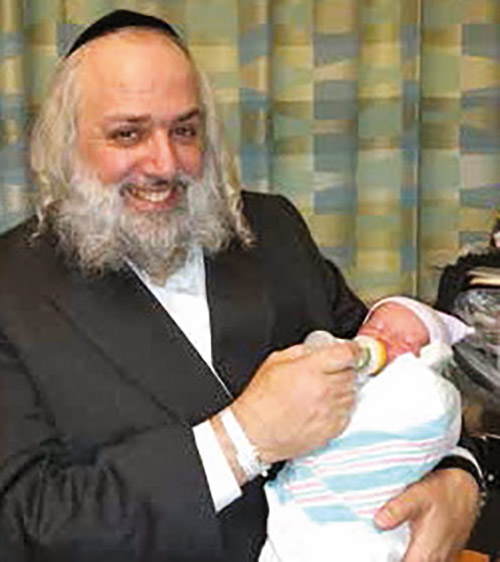
(Courtesy of Bonei Olam) When Moshe Aron Fulop of Brooklyn showed up at the maternity ward of a Manhattan hospital this August, the staffer at the front desk gave him a visitor’s pass.
“I’d like a father’s pass,” he said.
“Those aren’t for grandparents,” she answered. “They’re for dads only.”
“But I am a father!” he said. “My wife is here with my baby son! We had him yesterday.” The woman blinked and looked at him.
“No way,” she said. “With that white beard an’ all, I was certain you was the grandpa! I mean, you look like a grandpa, for sure. Lemme guess, then. What number is this? Number nine? Number ten?” Mr. Fulop smiled.
“Actually, it’s my first,” he said. The staffer’s jaw nearly hit the ground.
“You’re not sayin!” she exclaimed. “I know your community. You people have lots o’ babies, so if this one’s your first, that’s big, man. Real big.”
She was right. It was big—colossal, really. A really big simcha, a very big deal. At age 47, after decades of waiting and hoping, after so many losses and tears, after nearly coming to terms with the possibility that he would never have a child, Moshe Aron Fulop held his very own newborn son.
“I’m living in a dream,” he said, four weeks after the day he became a father. “All these years I had this big hole in my heart because I didn’t have a child, and now I have this precious tzaddik’l!”
Fulop’s saga began some 20-odd years ago, when he and his wife realized they had a problem. At first they were optimistic. But slowly, the months turned into years, and one by one their friends began to make simchas they could only dream about.
Upsherens. Bar mitzvahs. Graduations. Weddings.
They participated in every occasion, even bought gifts and danced with the baalei simcha. But there was a thick glass wall between them and the rest of the guests. They were set apart, different; another breed, almost. They were the ones with a tzara—the couple who’d never been up at night with a baby, who’d never taught a child the alef beis, who couldn’t possibly understand the nachas that wells up in a parent’s heart when a child delivers a pshetl or walks to the chuppah.
In family-centered Boro Park, it was impossible to distract themselves from their plight. The kids in the streets, the school buses on the roads, the children’s shoe and clothing and toy stores that dominate the community—all highlighted the emptiness in their spotless little apartment.
Throughout the years, Fulop tried with all his might to rejoice in others’ good fortune.
“I knew no one was taking anything away from me,” he said. So he tried to vicariously experience life’s joys through others. When people were insensitive or said things that seemed hurtful, he took no offense.
“I knew everyone meant well. They just didn’t know how to deal with us,” he said. But the couple’s desire for a child burned in their hearts. And so they tried.
They went to doctors and visited kivrei tzaddikim and never stopped davening and hoping. One big doctor at the Mayo Clinic sent them to a lab that offers hope to many patients. The results were discouraging. A mekubal examined their kesubah, and organizations called offering this or that segulah, all to no avail.
Until Fulop reached out to Bonei Olam. “I called to ask them to help pay for a procedure that could possibly help. They covered the entire bill, but that was just the beginning. Fulop described how Bonei Olam got involved in every aspect of the case—from rabbinical support to medical referrals and lab services.
“Bonei Olam’s lab really was the first to offer us hope,” he recalls. Although the testing they’d undergone previously had come back with poor results, Bonei Olam’s lab runs a much more comprehensive test. The results were much more hopeful.
And now, last August, their dream came true, and little Shimon was born.
“It’s like the Yam Suf split for us,” Fulop said. “Every avenue of help was closed. We’d tried them all. And then Bonei Olam jumped in and the yeshua came.”
There was another similarity to Kriyas Yam Suf: the kiddush Hashem and publicity. News about the baby’s birth hit social media and went viral. Photos of the “baby and his chassidic white-bearded dad” circulated around the world, and in a matter of hours, Fulop and his baby were famous. Though fame was not what he had been looking for all these years.
“All I wanted was to be a father. To raise a Yiddish kind and leave doros.”
Thanks to Hashem’s incredible chasadim, and the tireless efforts and dedication of His messengers at Bonei Olam, the Fulops are living their dream.
Bonei Olam will be launching its campaign on Sunday, May 9, and the launch will feature inspiring messages from the founder of Bonei Olam Rabbi Shlomo Bochner, a personal story by a mother helped by Bonei Olam, and an evening of music featuring Avrohom Fried. To learn more, visit: www.boneiolam.org/bergencounty.
Bonei Bonei Olam / Bonei Olam of Bergen County
600 S Prospect Ave
Bergenfield NJ 07621 / Bergencounty@boneiolam.org / 201.565.2591










